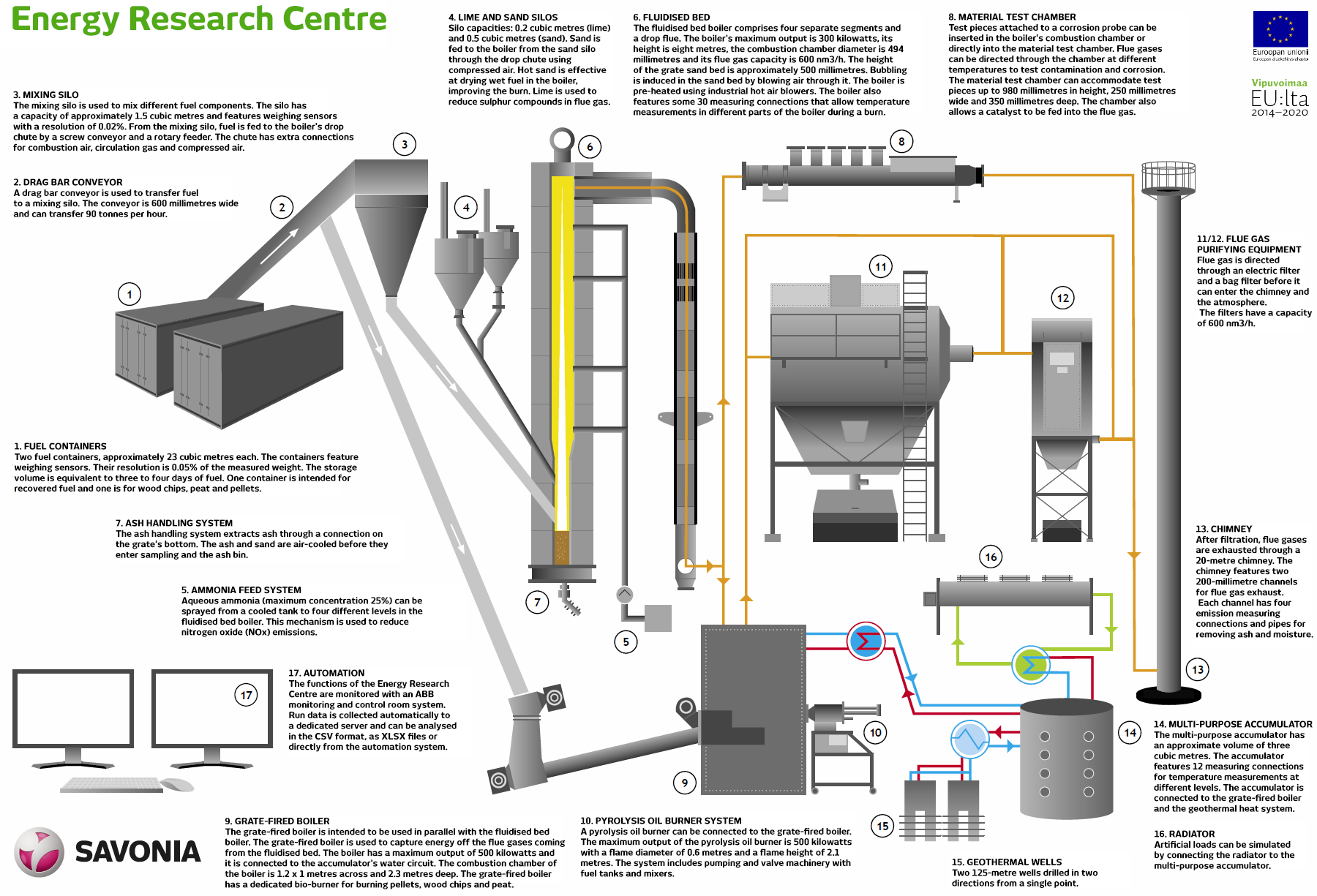Energy Research Centre
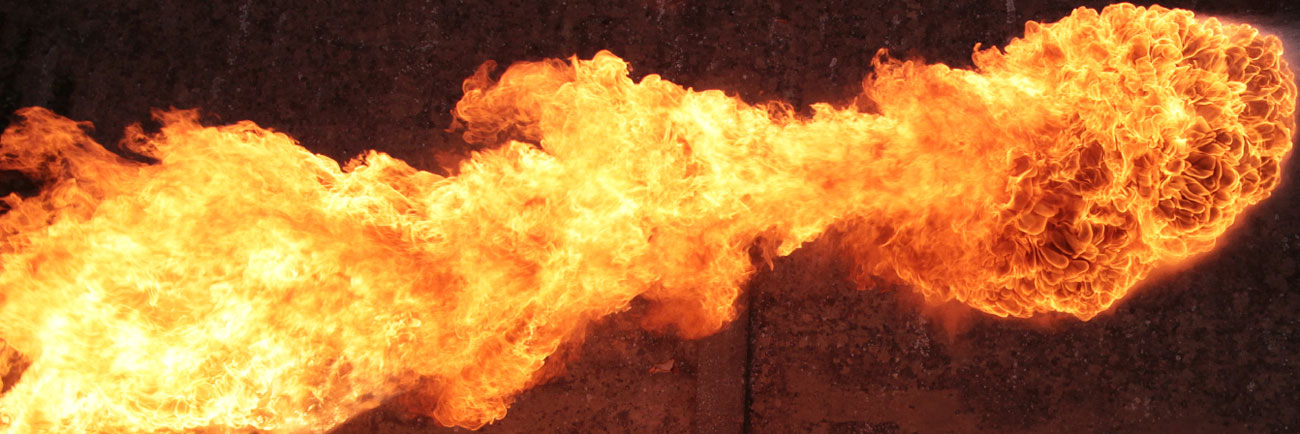
Energy Research Centre
#business
Energy Research Centre
The Energy Research Centre offers product development, product testing and training services for technology companies and other organisations operating in energy production, transfer and distribution.
Energy Research menu:
A complete test environment at your disposal
Our test environment allows for easy and affordable testing where we take on all the risks. We are a testing
laboratory T301 accredited by FINAS accreditation service (accreditation requirement SFS EN ISO/IEC 17025).
Diverse opportunities
We research and test issues related to the burning, material corrosion, emissions and emission control of
recovered fuels, wood chips and peat.
Know your product
Our comprehensive test results will give you new information about the properties of your product, enhancing your development.
Training on demand
The Energy Research Centre is used for basic and continued training in energy technology and can serve as a learning environment for tailored corporate training.
Services
Accredited flue gas emission measurements
Are the combustion emissions from your power plant known? We perform emission and particle concentration measurements for power plants and incineration plants, as well as flue gas temperature and flow measurements.
We are a testing laboratory T301 accredited by FINAS accreditation service (accreditation requirement SFS-EN ISO/IEC 17025).
The measurements include the emission measurement of gas components and particles, as well as temperature and flow measurements of flue gases using modern and standard methods. In addition, we provide advice on the safety of the measuring site, its location and the preparation of the right kind of measuring site. The emission measurements include the measurement plan required by the authority and the operating report with its conclusions. If necessary, we provide guidance on the correct and safe use of the facility.
Gas component concentrations are measured using the Gasmet DX4000 FTIR and MRU MGAprime Q NDIR gas analysers. Particle measurements are performed with STL Combi Dust Sampler equipment. The state of the gases (temperature and flow rate) is measured using a VelociCalc micromanometer using a K-type temperature sensor and either an L- or S-pitot tube.
The determination of gaseous emissions is carried out in accordance with the standards for the determination of gaseous emissions (CEN/TS 17337, EN 14789, EN 14790, ISO 12039, SFS-EN 15267-4 and SFS 5624). Particle measurements are carried out in accordance with standard SFS-EN 13284-1 and flow measurements are carried out in accordance with standard SFS-EN ISO 16911-1.
Our accredited services include particle, H2O, CO2, CO, NOx, SO2, O2 concentrations.
Fuel testing (solid fuels)
The Energy Research Centre offers product development, product testing and training services for technology companies and other organisations operating in energy production, transfer and distribution.
Fuel analysis
Want to find out what you are paying your fuel supplier for?
Our fuel analysis will determine the properties and quality of your fuel, including its moisture content and energy content (calorific value and ash content). The analysis follows SFS EN ISO standards (21654:2021, 18134-2:2017, 18122:2022:en).
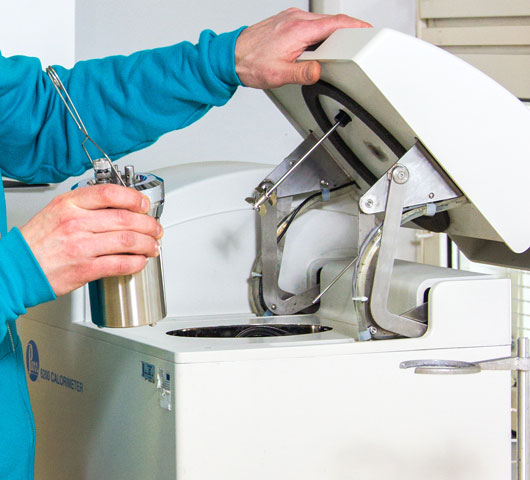
High temperature rotary tube furnace for material processing
Do you want to determine the processing temperature of your product or, for example, separate heavy metals from ash or other side streams?
The electro-heated high temperature rotary tube furnace enables calcination and heat to process of materials so that the temperature and residence time of the process can be adjusted as desired, as well as carrying out oxidation-reduction reactions using gases fed into the furnace. For example, the furnace can be used to process heavy metal ash so that the heavy metals are vaporized and recovered with a filter, making the processed ash more easily recyclable for recovery in terms of concentrations.
The processing temperatures are from +20 °C to +1000 °C. In a rotary tube furnace, the residence time of the treatment (1⁄2 – 4 hours) can be influenced by adjusting the angle of inclination of the rotary tube.
The material processing can be done by controlling the gas phase. Air or nitrogen and a nitrogen-hydrogen mixture can be used as gases. Other gases are also possible.
Vapors and particles leaving the furnace can be collected on the filter for further investigation.
Corrosion and material testing
Boiler material corrosion testing with a corrosion probe
Having material corrosion issues due to fuels or running method? In trouble with chlorine and low temperatures? New emission control methods and additives giving you a headache?
In boiler material corrosion testing, a corrosion monitoring probe with a test piece is placed inside the fluidised bed boiler. The probe is both water- and air-cooled, keeping it at the desired temperature.
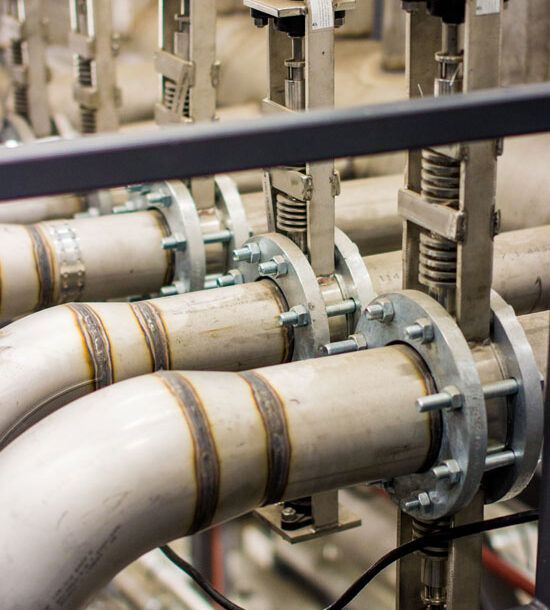
Burn tests and combustion chamber reactions with mixed fuels and catalysts
Do you want to test new alternative fuels or study the effects of contamination on running, ash behaviour or corrosion? Need solutions to problems with ash storage and disposal, but unclear on the composition of the ash?
Bed reaction tests with difficult fuels
(Run model development based on bed reactions and bed layer melting point measurements at different sodium, potassium and aluminium concentrations.)
We can perform bed reaction tests in our test environment using difficult fuels, burning the desired fuel in the fluidised bed boiler and adding fuel containing the problematic compounds while monitoring the melting of the bed and its ash. The purpose of the tests is to find a secondary fuel or sorbent to raise the bed’s temperature limit.
The effects of contamination on running, ash behaviour and corrosion
For the test, a desired running behaviour model is defined in advance with the customer. The boiler is run for periods to achieve the desired contamination and layers on the surface of the corrosion probe. This enables corrosion behaviour, ash fraction and running method adjustment testing.
Properties of ash with different mixed fuels, elementary analysis of ash
Our test arrangements allow the burning of both a primary and a secondary fuel in a fluidised bed boiler, as well as the feeding of catalysts and binders into the fuel and flue gas. Both fly ash and bottom ash can be collected from the fluidised bed boiler, the flues and purifying equipment, allowing the analysis of their elemental composition and solubility.
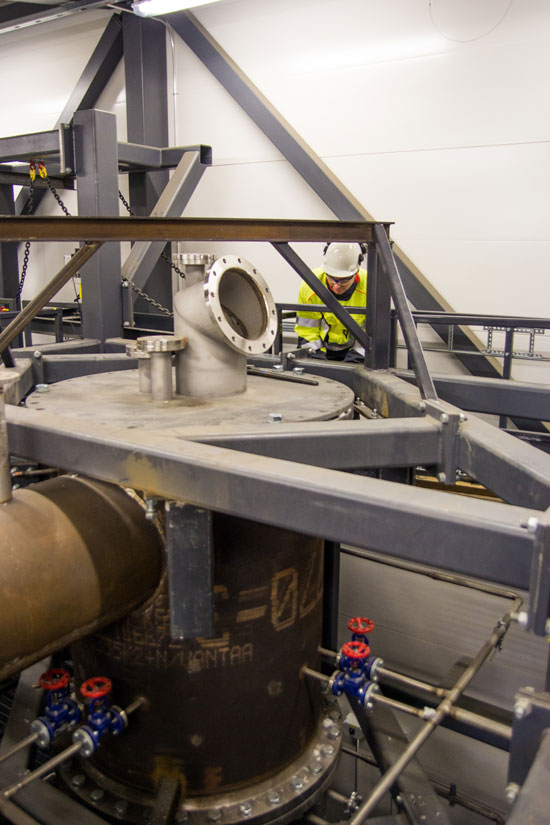
Efficiency analyses and purifier testing
Efficiency analyses
Are you sure the boiler is working as it should? Will all the available heat be recovered from the boiler or will it be wasted?
We perform efficiency analyses for boiler plants that produce hot water.
Boiler efficiency is determined according to the customer’s wishes, either by direct method, indirect method or both. The efficiency determination is carried out using the standard (SFSEN 12952-15) or customized according to the customer’s wishes.
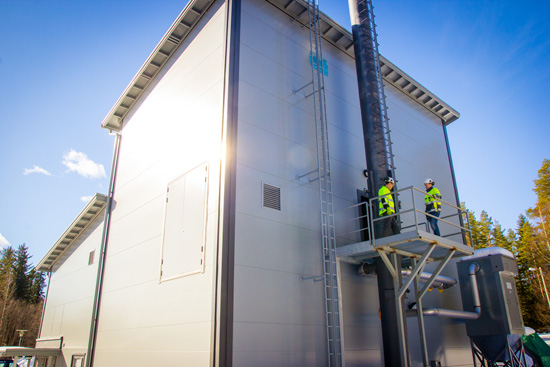
Purifier testing for different types of flue gas flow
Do you need a test environment for the technical solutions of purifying equipment? Would you like to know how your equipment performs under different conditions?
The research centre features two purifiers: an electric filter and a bag filter. Different flue gases can be run through both, one or neither filter. There are several points before and after the filters for measuring flue gas composition and particle concentration.
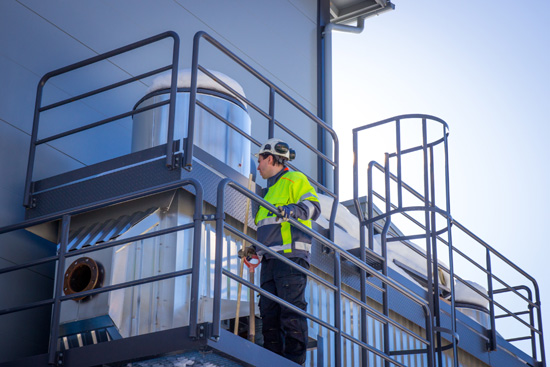
Training
The Energy Research Centre is utilised in basic and continuing education in energy technology and it also serves as a learning environment for companies in tailored training.
In addition to education for both young people and working adults leading to Bachelor of Engineering the field of Energy Technology also offers other advanced and continuing education in technology for the needs of today and the future.
Contact us and tell us about your training needs!
In addition to our fluidised bed and grate-fired boiler test environment, we can also carry out measurements and testing at your location or a custom test environment built in the research centre. Research environments are used for basic and continued training in energy technology and can also be used as a learning environment for tailored corporate training.
Facilities and equipment
Our training and research test environments are located in the Energy Research Centre’s research hall, featuring 166 square metres of floor space 12 metres in height.
- Fluidised bed boiler and grate-fired boiler.
Fluidised bed boiler environment
The fluidised bed boiler is the heart of the research centre. The boiler comprises four separate segments and a drop flue. The maximum output of the fluidised bed boiler is 300 kW. The height of the boiler is eight metres and its flue gas capacity is 600 nm3/h. The diameter of the combustion chamber is 494 millimetres. The height of the grate sand bed is approximately 500 millimetres.
The fluidised bed can be used to analyse the effects of varying fuels and mixing ratios on flue gas generation without feed level changes affecting the burn or the circulation gas feed affecting the boiler. The boiler also features a number of measuring connections that allow temperature measurements in different parts of the boiler during a burn.
The flue gas exiting the fluidised bed boiler can be directed through filters and into a chimney or a corrosion test chamber. The chamber allows the testing of the gas’ corrosive properties and the testing of how different fuels affect these properties.
The system features a separate channel and flue gas extractor that can create a secondary flow for various tests, such as catalyst feeding and purification testing. The values of the secondary flow can be compared to the values of the primary flow.
Grate-fired boiler
The grate boiler is intended to work alongside the fluidized bed boiler. It captures the energy of flue gases coming from the hover bed. The grate boiler has a power output of 500 kW. The firebox has a diameter of 1.2 x 1 m and a depth of 2.3 m2.
The grate boiler also has its own bio-burner, which can be used to burn pellets, wood chips and peat.
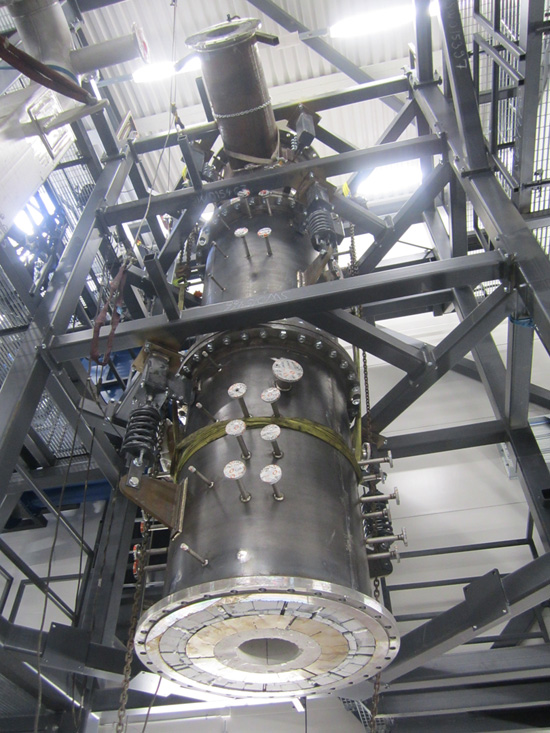
The hall also features two 125-metre geothermal wells drilled from the same point in two different directions, as well as a test environment for exchangers and accumulators.
The energy technology laboratory features versatile measuring and analysis equipment for determining the performance and energy efficiency of both devices and processes under laboratory and field conditions.
Interested? We will be happy to show you around – come see the centre!
Together we can design tests that meet your needs.
Projects
The Savonia University of Applied Sciences and the Energy Research Centre carry out and participate in different research and development projects. We utilise regional, national and international networks in our projects.
Ongoing:
Power plants as part of Circular Economy and Renewable energy solutions
Power plant boilers play a central role in terms of society’s security of energy supply and the achievements of renewable energy goals regionally, nationally and also in the wider European region. In addition, significant raw materials flows pass through power boilers, for which the utilization in terms of circular economy is important to achieve. In the region of North-Savo, and especially in Central Savo, there is a wide network of energy sector operators, whose economic importance is great . The project’s target group is these companies in the energy and technology sector, the SMEs that provide services for them, as well as energy-intensive operators that use a lot of energy in their production or business.
Objectives of the project:
- The general objective of the project is to develop the operations of North-Savo’s energy sector in such a way that the transition to carbon-neutral energy production takes place in a controlled and socially just way without jeopardizing the security of energy production and at the same time utilizing the raw material flows generated in accordance with the principles of the circular economy.
- The project focuses especially on the controlling of ash-related problems in boilers when switching to more difficult bio- and waste-derived fuels, the utilization and processing of ash and other industrial side streams, and the equipping of pilot and laboratory test environments with advanced measurement methods.
The implementation period of the project is from 1st October 2022 to 30th September 2026.
The total cost estimate for the Savonia mainproject is 375.789 euros (development) and 523.750 euros (investments). The project is co-funded by the European Union (70 – 80 %). The private contribution is 6,63 % euros (development project) and the Savonia contribution is 13,37 – 25 %%. The project is carried out together with University of Eastern Finland.
More information: RDI Expert Petteri Heino, Tel. +358 44 785 6759, firstname.lastname@savonia.fi
Energy Cluster North Savo
Objectives of the project:
- Consolidation and expansion of the Northern Savo Energy Cluster.
- Renewable energy industry and RDI activities.
Promotes the formation of carbon-neutral energy production value chains. Promotes the renewable energy industry, including innovation in hydrogen economy, carbon capture and new energy storage systems, through e.g. R&D groups and stakeholders, and through the dissemination of information.
- Development of a subcontractor network for the energy industry.
The implementation period of the project is from 1st.August 2023 to 30th April 2026
The total cost estimate for the Savonia subproject is 344.439 euros. The project is co-funded by the European Union (75%). The private contribution is 14.93% and the Savonia contribution is 10.07%. The project is carried out together with Navitas Kehitys Oy (executor of the main project) and Savo Consortium for Education.
More information: RDI Expert Petteri Heino, Tel. +358 44 785 6759, firstname.lastname@savonia.fi
Examples of projects implemented
- Heat Circulation in Northern Savonia
- Development of North Savo Energy Technology RDI ecosystem, EnEko 2020
- Solutions for BIo and Garbage Boiler Behavior and Emissions Control (BI TUM)
- North Savo Energy Technology RDI ecosystem development plan
- VALTEK Ensuring the competitiveness and growth of the manufacturing industry
- UEP Renewable energy in small projects
- Developing and evaluating energy solutions based on pyrolysis oils (Pyreus)
- Material -efficient circular economy business in North Savo (KILIKE)
The Savonia University of Applied Sciences and the Energy Research Centre carry out and participate in different research and development projects. We utilise regional, national and international networks in our projects.
Contact information
Savonia University of Applied Sciences
Energy Research Centre
P.O. Box 1000 (Opiskelijankatu 3)
FI-78201 Varkaus
FINLAND
RDI Expert
Petteri Heino
Tel. +358 44 785 6759
firstname.lastname@savonia.fi
